On March 22, 2006 - something on campus changed my mind about "vegitarianism/vegan" lifestyle.
If you really want a good idea about all the posters- then you should go to PETA's online exhibit...personally I would turn off audio part if you find the British woman's voice grating (why is it even a British woman's voice? I don't know).[Propaganda warning!!! The PETA online exhibit- as you would expect - is skillfully crafted to emotionally "hook" you.]
This is my account of what happened on campus that day:
I was walking along Sproul Plaza and I actually passed these gigantic posters by thinking "oh, ok its another walking exhibit of human oppression (as is usually the case for displays on Sproul)" But I was late to class and rushed by.
After class I had to go to a different part of campus and was walking up the stairs from lower Sproul to upper Sproul Plaza and I noticed something. On one side was a picture of a slave's foot in a chain and the other side was a picture of an elephant's foot and the picture was entitled "ENSLAVED".
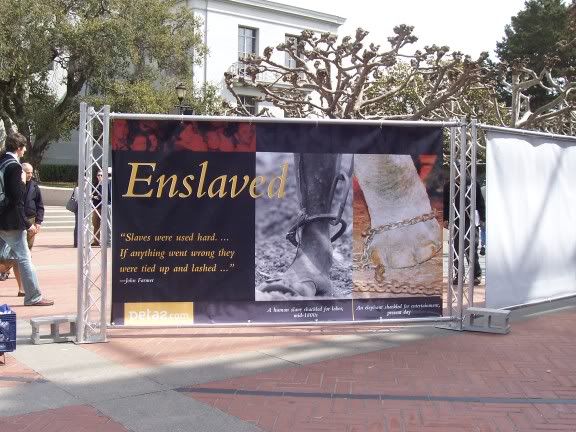 My first reaction being "WTHeck!" and a familiar feeling of outrage regarding the all too typical depiction of minority bodies welling up through my system. At that point I bumped into my friend Dominique and we (combined minds of Ethnic Studies and Sociology) immediately expressed our outrage to each other. I remember thinking, "Whaaaaa? Is that even allowed (I mean the slave foot next to the elephant foot)? What the heck is going on? What the heck is this exhibit about?".
My first reaction being "WTHeck!" and a familiar feeling of outrage regarding the all too typical depiction of minority bodies welling up through my system. At that point I bumped into my friend Dominique and we (combined minds of Ethnic Studies and Sociology) immediately expressed our outrage to each other. I remember thinking, "Whaaaaa? Is that even allowed (I mean the slave foot next to the elephant foot)? What the heck is going on? What the heck is this exhibit about?".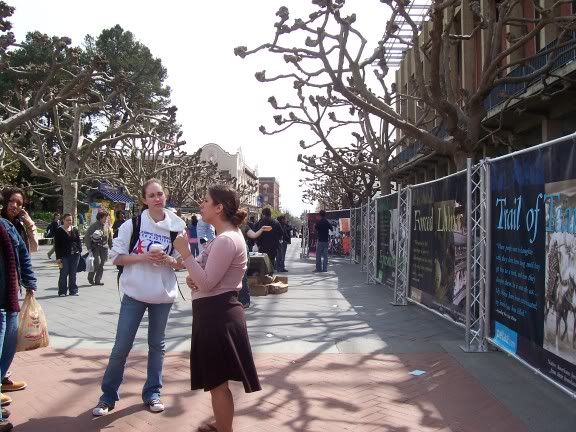
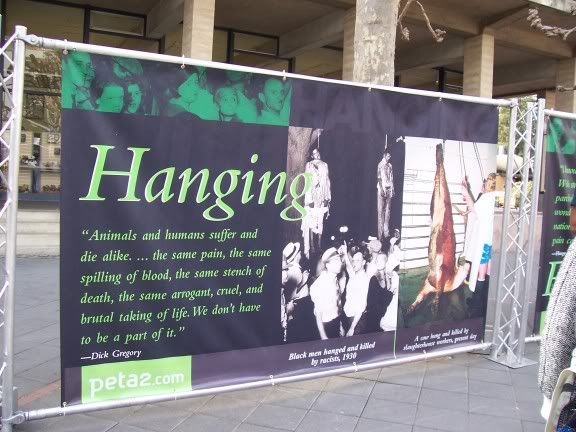
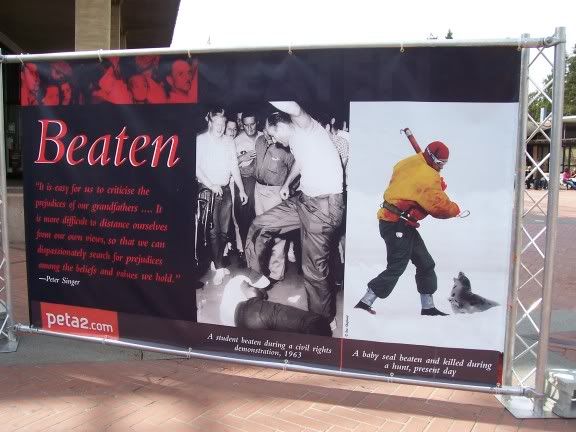
Apparently, this exhibit is called "The Animal Liberation Project", a PETA exhibit that equates human oppression with animal oppression.
Dominique and I went around to the front of the exhibit (in an interesting placement- the
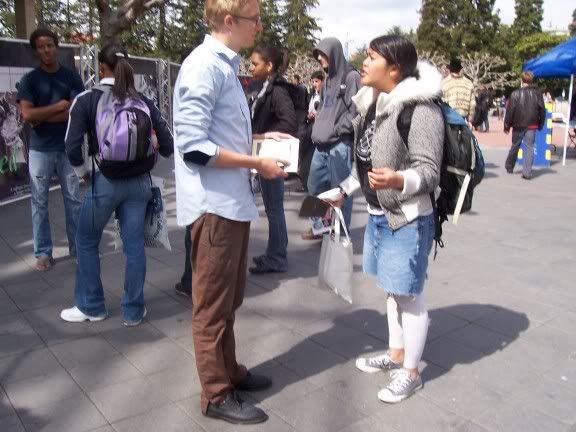 slavery poster was on the back of the exhibit with the "less controversial" ones on the other side facing traffic). Dominique started talking to the animal rights people in front of the exhibit. Several discussions popped up. Eventually, things got heated as some Berkeley students emphatically argued with the animal rights people.
slavery poster was on the back of the exhibit with the "less controversial" ones on the other side facing traffic). Dominique started talking to the animal rights people in front of the exhibit. Several discussions popped up. Eventually, things got heated as some Berkeley students emphatically argued with the animal rights people.The basic arguement of the animal rights people are that the exhibit is saying that animal oppression and human oppression is wrong- any oppression is wrong. [Here's a statement from
Sangeeta Kumar, a coordinator for the Animal Liberation Project. http://www.dailycal.org/sharticle.php?id=21707]
The Animal Liberation Project carries a message of compassion and a plea for justice. It encourages people to open their hearts and minds to the fact that all cruel acts must be denounced, no matter how inconvenient or uncomfortable it is to do so. Many of the horrors in our society's history are linked by the notion that "might makes right" and by the exploitation of less powerful groups of people. The beliefs of a bygone era seem ridiculous now, and it's now unacceptable to say what was commonly spoken not so long ago: "They're only immigrants." "Who cares about slum children" "Women and slaves aren't as intelligent as white men."
This same attitude, with its old tired cliches, is now seen being offered in defense of enslaving, abusing and killing billions of animals: "Animals aren't as intelligent." "They don't suffer like people." "They don't have feelings or needs; they're only animals."
....We have wrongly accepted the suffering of animals as routinely as we once accepted slavery, Native American genocide, child labor, and other heinous crimes-until kind and thoughtful people demanded change.
... Looking back on the cruel treatment of human beings in the past with indignation is understandable. But taking a stand against contemporary cruelty to animals is also important and in no way denigrates people.
But what Berkeley students were saying was that by having the pictures side by side- equates animal oppression with human oppression (not in the same way PETA people mean). The pictures of human (and minority) oppression were in black and white and the pictures of the animal cruelty were in color. This implies that "hey oppression of minorities is in the past. It's over! There is no more racism. Let's move on to the next oppression- animals!". It minimizes the effect that racism and human suffering still exists. And I'm sure it doesn't help PETA at all that most of it's members are middle class and white. It uses imagery like lynchings of people to equate with the hanging of a cow. The sensationalist posters makes you feel more for the animals than the people (or try to at least).
I'm sure it did not help the Animal Rights people that it was "Black Wednesday" which was traditionally a day out of the week when black students gather together on Sproul as a space for themselves because they are so underrepresented on campus. The black students were gathering not 50 yards away and the slavery poster was facing them directly.
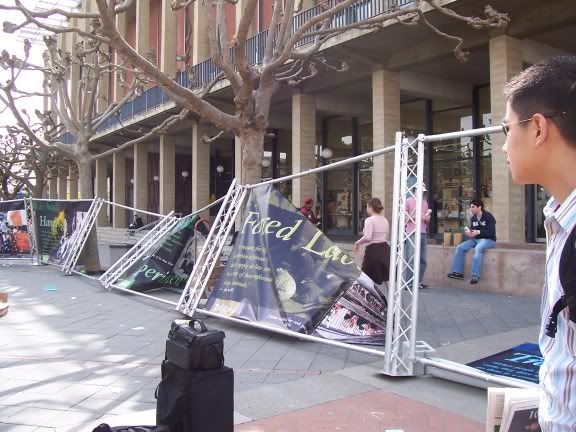 At some point some angry students (high school or college) threw cups of ketchup and mustard at the lynching and slavery exhibits. One black student started to tear down the posters while the Berkeley students were discussing with the animal rights people. The black student, once done tearing down the signs (against the verbal protest of the animal rights people), calmly started walking away. The animal rights people called the cops. UCPD came and took the man aside.
At some point some angry students (high school or college) threw cups of ketchup and mustard at the lynching and slavery exhibits. One black student started to tear down the posters while the Berkeley students were discussing with the animal rights people. The black student, once done tearing down the signs (against the verbal protest of the animal rights people), calmly started walking away. The animal rights people called the cops. UCPD came and took the man aside.This then sparked more anger. Not only did the mostly white animal advocates have the
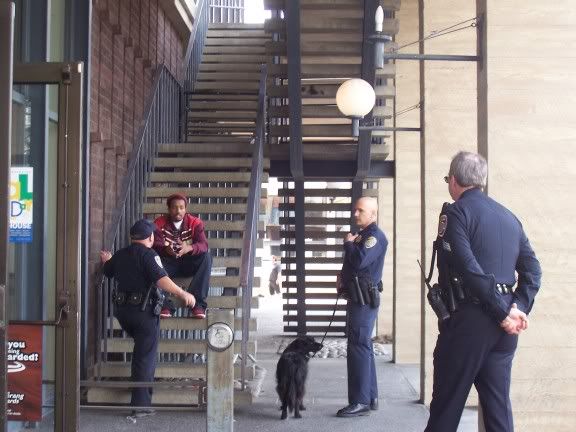 exhibit, but some argued that it caused another black man to get into conflict with the cops. My take is that the UCPD was walking around like they generally do on campus and saw what happened and walked over. But of course this enraged some students even more.
exhibit, but some argued that it caused another black man to get into conflict with the cops. My take is that the UCPD was walking around like they generally do on campus and saw what happened and walked over. But of course this enraged some students even more.After about a half hour to an hour of more discussion- eventually the Berkeley students got the animal rights people to take down the signs.
[My thoughts]
First off, because in part to this I am not interested in being a vegetarian. I believe I can still be healthy and not be a vegetarian. I don't know if I want to be equated with that kind of movement/ideology. I was never political about it is the first place, but now to an extent I am. I am going to worry about human rights first. I believe that if we do begin to value humanity- we will learn to conserve our resources and end up doing things in ways that are not so grossly wasteful and hurtful.
From the discussion I heard that day - I thought it was at best ignorant and at worst hurtful.
The animal rights people is composed of mostly white middle class people who can afford to eat well (organic, vegetarian, etc). From talking to the animal rights advocates you could tell that they were spouting the same statements over and over. Some were "both humans and animals deserve the same rights", "oppression of all things is unjust", and even once was a "we didn't know". And that is exactly the kind of thing I am talking about. "We didn't know" could also be "we didn't think". And "we didn't think" leads to the continued invisibilty of racial struggle. They couldn't, at any point, say - you're right we'll think about it. For that at least I would have felt better about.
Yet the exhibit made me feel under siege in my own campus. Campus is supposed to be a safe place, a place where we are free to be ourselves and grow. This is ideal and does not always come to fruition. But I cannot recall any other day when something so racist was so blatant.
Maybe it was not conscious. I will give them that. But that is the point. That people are ignorant or downright stupidly unwilling to see the racism in that exhibit. That people think that with the passage of universal suffrage, civil rights laws, etc that our society is somehow "color-blind". And I cannot even begin to image the depth of pain and suffering that the black students felt on that day (and everyday on campus).
The one good thing that happened is that the Berkeley campus also felt so alive at that moment. That you could see the passion and the understanding that some students on campus feel. That that determination, grace, and intellect is what carries movements and brings change.
Yet you could also feel the simmering hostility. That Cal's campus is not ideal. That the tension is at times so taut because it is so difficult to be a student of color (even a person of color) sometimes.
More articles/websites:
- Video of one discussion that took place.
http://www.youtube.com/watch?v=otqVOH_F8qs
- Daily Cal's Original article
http://www.dailycal.org/sharticle.php?id=21637
- Editorials in response
http://www.dailycal.org/sharticle.php?id=21664
http://www.dailycal.org/sharticle.php?id=21707
- The PETA website concerning "The Animal Liberation Project"
http://www.peta.org/animalliberation/
1 comment:
hi miss halology. someone told me about your blog here (*koff*koff*joanne*koff*koff*), and i think it's wonderful. would you mind if i link to it on my blogs?
anyway, i had no idea about this peta fracas on campus, but i'm glad you blogged about it. thanks for the inisights about the dangers of making this kind of analogy. the peta people probably thought it was an easy analogy to make because their target audience was liberal white people who find this history objectively painful rather than people of color who find this history personally painful as well. it's a lesson to all of us.
Post a Comment